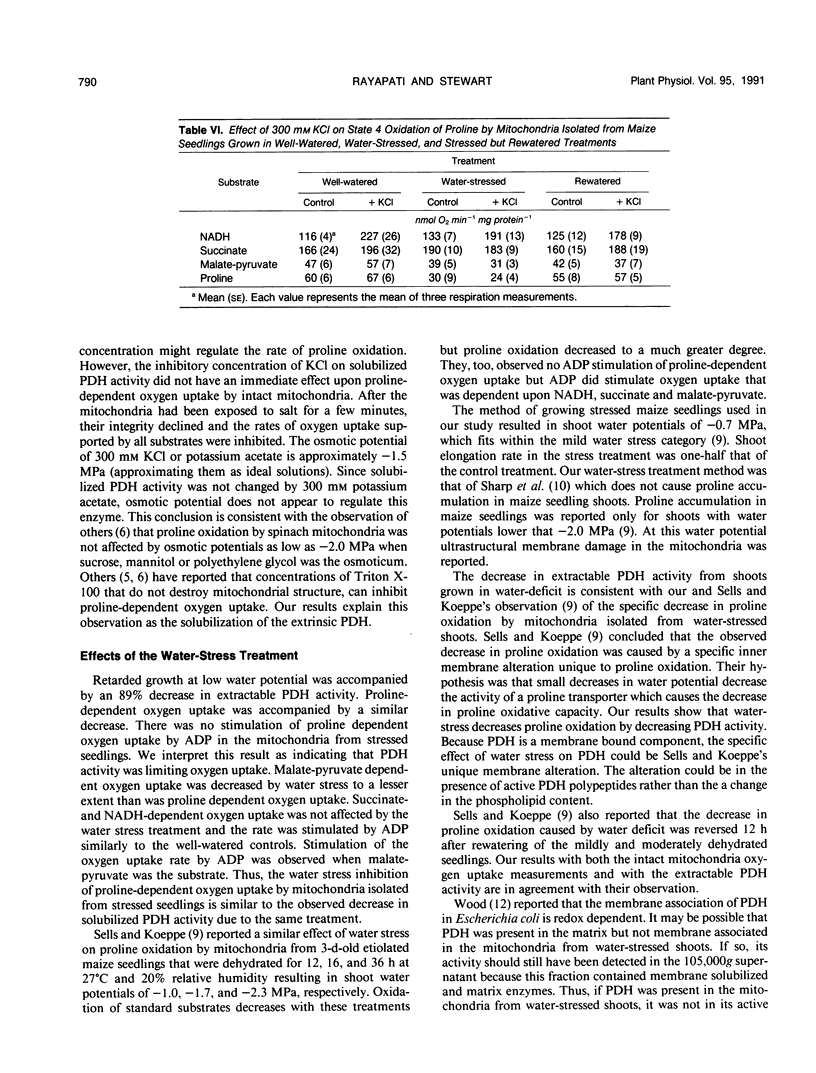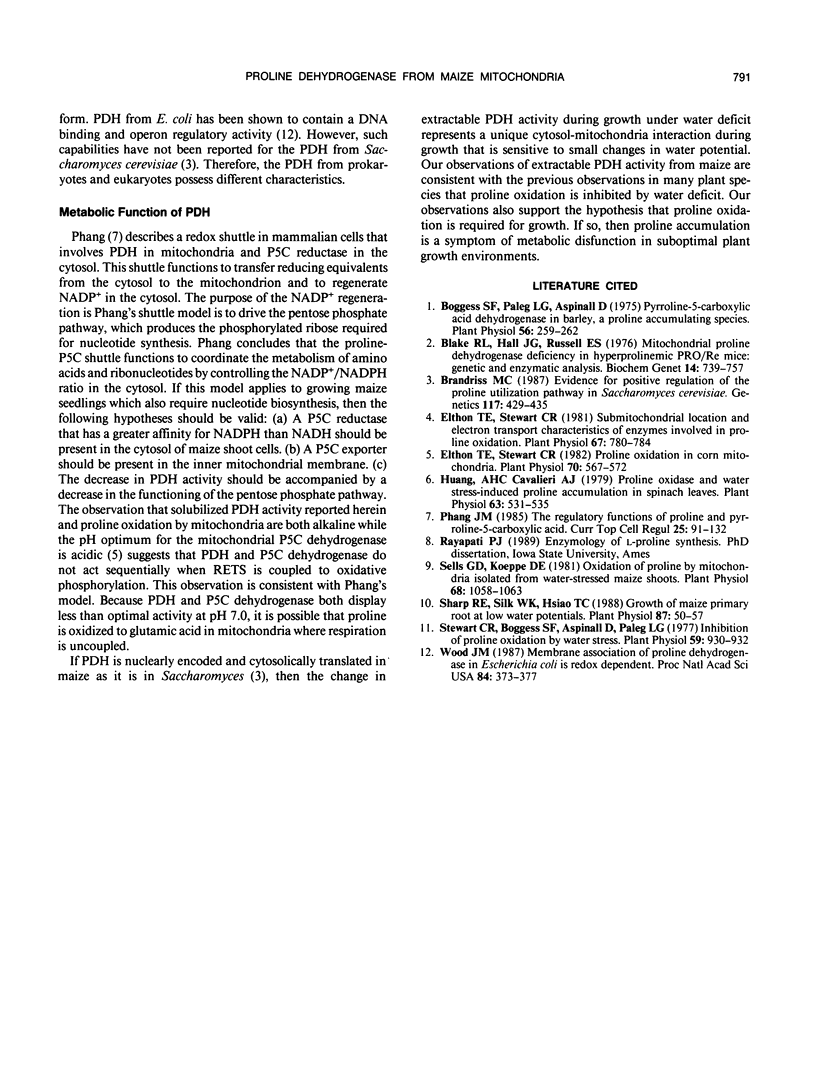Abstract
L-Proline is oxidized to pyrroline-5-carboxylic acid in intact plant mitochondria by a proline dehydrogenase (EC 1.4.3) that is bound to the matrix side of the inner mitochondrial membrane (TE Elthon, CR Stewart [1981] Plant Physiol 67: 780-784). This investigation reports the first solubilization of the L-proline dehydrogenase (PDH) from plant mitochondria. The supernatant from NP-40-treated etiolated shoot mitochondria of maize, Zea mays L., reduced iodonitrotetrazolium violet in a proline dependent manner. The pH optimum for this activity was 8. The apparent Km for proline was 6.6 millimolar. When supplied with proline, this solubilized PDH activity also synthesized pyrroline-5-carboxylic acid. The PDH activity was inhibited in vitro by 300 millimolar potassium chloride but not by 300 millimolar potassium acetate. The PDH activity had a molecular mass that was greater than 150 kilodaltons. Mitochondria were prepared from etiolated shoots grown in 100% water-saturated vermiculite (control) and 16% water-saturated vermiculite (stress). The specific activity of solubilized PDH from the stress treatment was 11% of the same activity from the control treatment. Oxygen uptake in the presence of proline and ADP (state 3 proline oxidation) by mitochondria from the stress treatment was 25% of the same rate by mitochondria from the control treatment. Mitochondria were also prepared 16 hours after rewatering the seedlings growing in the stress treatment. Both the solubilized PDH specific activity and state 3 proline oxidation returned to the control levels. The specific activities of the NAD+-dependent pyrroline-5-carboxylic acid dehydrogenase and cytochrome c oxidase in the solubilized preparations were unaffected by these stress and recovery treatments. Oxygen uptake rates by intact mitochondria in the presence of ADP and NADH, succinate or malate-pyruvate were also unaffected by these treatments.
Full text
PDF




Selected References
These references are in PubMed. This may not be the complete list of references from this article.
- Blake R. L., Hall J. G., Russell E. S. Mitochondrial proline dehydrogenase deficiency in hyperprolinemic PRO/Re mice: genetic and enzymatic analyses. Biochem Genet. 1976 Oct;14(9-10):739–757. doi: 10.1007/BF00485338. [DOI] [PubMed] [Google Scholar]
- Boggess S. F., Paleg L. G., Aspinall D. Delta-Pyrroline-5-carboxylic Acid Dehydrogenase in Barley, a Proline-accumulating Species. Plant Physiol. 1975 Aug;56(2):259–262. doi: 10.1104/pp.56.2.259. [DOI] [PMC free article] [PubMed] [Google Scholar]
- Brandriss M. C. Evidence for positive regulation of the proline utilization pathway in Saccharomyces cerevisiae. Genetics. 1987 Nov;117(3):429–435. doi: 10.1093/genetics/117.3.429. [DOI] [PMC free article] [PubMed] [Google Scholar]
- Elthon T. E., Stewart C. R. Proline Oxidation in Corn Mitochondria : Involvement of NAD, Relationship to Ornithine Metabolism, and Sidedness on the Inner Membrane. Plant Physiol. 1982 Aug;70(2):567–572. doi: 10.1104/pp.70.2.567. [DOI] [PMC free article] [PubMed] [Google Scholar]
- Elthon T. E., Stewart C. R. Submitochondrial location and electron transport characteristics of enzymes involved in proline oxidation. Plant Physiol. 1981 Apr;67(4):780–784. doi: 10.1104/pp.67.4.780. [DOI] [PMC free article] [PubMed] [Google Scholar]
- Huang A. H., Cavalieri A. J. Proline Oxidase and Water Stress-induced Proline Accumulation in Spinach Leaves. Plant Physiol. 1979 Mar;63(3):531–535. doi: 10.1104/pp.63.3.531. [DOI] [PMC free article] [PubMed] [Google Scholar]
- Phang J. M. The regulatory functions of proline and pyrroline-5-carboxylic acid. Curr Top Cell Regul. 1985;25:91–132. doi: 10.1016/b978-0-12-152825-6.50008-4. [DOI] [PubMed] [Google Scholar]
- Sells G. D., Koeppe D. E. Oxidation of proline by mitochondria isolated from water-stressed maize shoots. Plant Physiol. 1981 Nov;68(5):1058–1063. doi: 10.1104/pp.68.5.1058. [DOI] [PMC free article] [PubMed] [Google Scholar]
- Sharp R. E., Silk W. K., Hsiao T. C. Growth of the maize primary root at low water potentials : I. Spatial distribution of expansive growth. Plant Physiol. 1988 May;87(1):50–57. doi: 10.1104/pp.87.1.50. [DOI] [PMC free article] [PubMed] [Google Scholar]
- Stewart C. R. Inhibition of proline oxidation by water stress. Plant Physiol. 1977 May;59(5):930–932. doi: 10.1104/pp.59.5.930. [DOI] [PMC free article] [PubMed] [Google Scholar]
- Wood J. M. Membrane association of proline dehydrogenase in Escherichia coli is redox dependent. Proc Natl Acad Sci U S A. 1987 Jan;84(2):373–377. doi: 10.1073/pnas.84.2.373. [DOI] [PMC free article] [PubMed] [Google Scholar]


